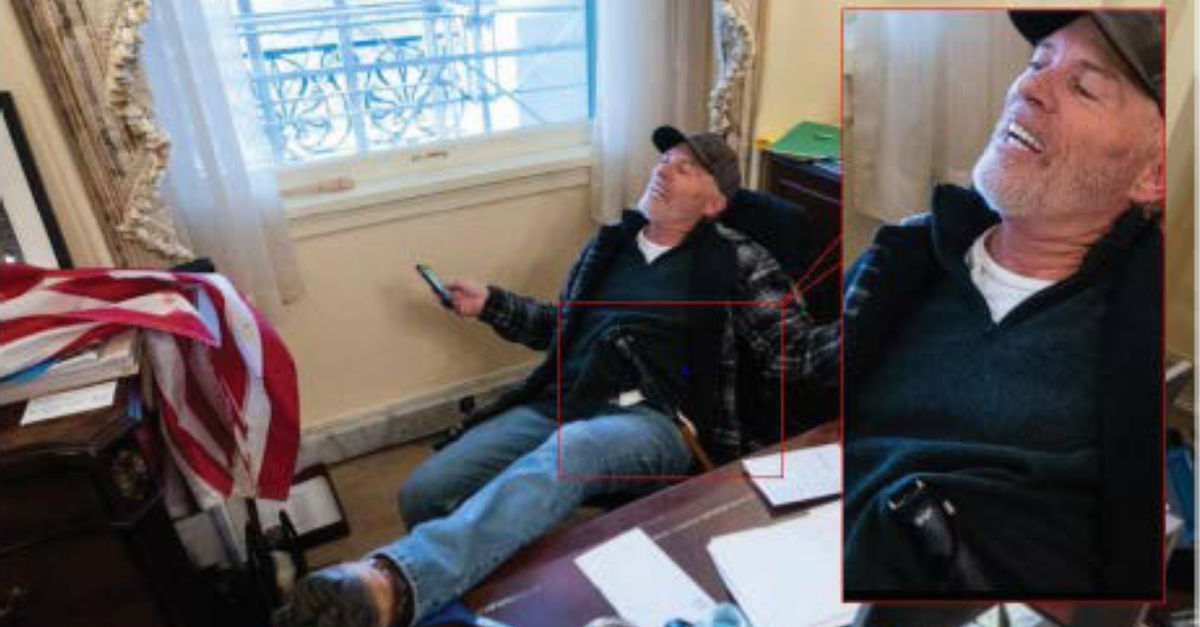
Richard Barnett, who kicked up his feet on a desk in Speaker Pelosi’s office, had a stun gun at the time.
A federal judge refused to ease up on the pre-trial restrictions of an accused U.S. Capitol rioter photographed with his foot on a desk inside Nancy Pelosi’s office to let the man buy and sell classic cars. Prosecutors called for the opposite response, asking to give him a curfew and make him report his assets.
The photograph of Richard “Bigo” Barnett gleefully kicking a foot on a desk inside Pelosi’s office instantly made him an icon of the Jan. 6th siege. For the chief judge of the District of D.C., the image showed a man who was “brazen, entitled, and dangerous.” Prosecutors zoomed in on the image to show he had a stun-gun in his pants. He also allegedly left Pelosi a note: “Nancy, Bigo was here, you biatch.”
Despite this history, Barnett was able to secure his release from jail in light of recent D.C. Circuit precedent making it harder to keep accused rioters detained before trial. Barnett has hardly kept a low profile since being released on bond. He had a birthday party at his home. Prosecutors said that local law enforcement was called to Barnett’s home, twice, and he appeared with his lawyer on Russian state television, which depicted him as a political prisoner.
After Barnett lost his job as a window salesman, the Arkansas man asked to loosen his restrictions to pursue what his lawyer described as his lifelong hobby of classic car dealing. But U.S. District Judge Christopher Cooper, who recently asked whether the business was more of a “side hustle,” refused to give him a longer leash.
“The Court is not persuaded that the Defendant cannot pursue gainful employment within a 50-mile radius of his home as permitted by the current conditions,” Cooper wrote in a one-paragraph minute order on the court’s docket. “The Court will consider requests for limited exceptions to the challenged condition for bona-fide employment purposes (as well as for other purposes permitted under the current conditions). Any such requests shall indicate in full the position of the Defendant’s pre-trial services officer on the request.”
In a scathing six-page brief, federal prosecutors on Thursday called for tightening the screws on Barnett—not the opposite.
“In sum, the defendant’s compliance has been questionable, and the defendant’s chosen employment activities make verification—in other words, ensuring the safety of the community—difficult,” the government’s brief states. “Ultimately, this reality does indeed suggest a different set of conditions, but not the one the defendant proposes.”
In one of the most egregious instances cited by prosecutors, Barnett started fundraising for his legal defense by selling autographed copies of the Pelosi picture.
Prosecutors pointed out in a footnote that one of the many problems with that fundraising practice is that image taken by the press would “seem to be protected by copyright.”
The prosecution’s proposed new set of restrictions include requiring Barnett to stay inside his home except during business hours, from 9 a.m. to 5 p.m. and report all money from any source, including spousal income, to pre-trial services.
Judge Cooper did not address that request in his brief minute order on Friday.
(Image from court papers)